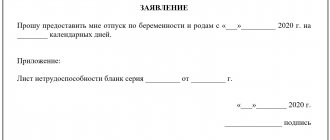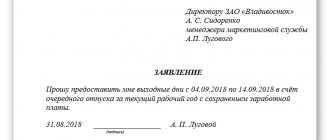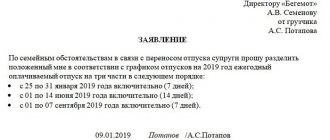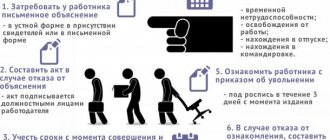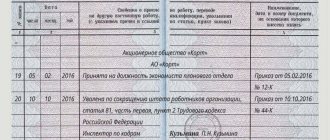Reasons for absence from work
Workers are asked to take time off in most cases for several hours, sometimes for a day. The situation is not regulated in the Labor Code of the Russian Federation or other regulations, including labor law norms. This means that they decide on the possibility of asking for time off and on how to write a statement for absence from work, taking into account specific circumstances. There are different reasons for taking time off from work; the employee receives permission from the employer in any case. The boss is obliged (Article 128 of the Labor Code of the Russian Federation) to allow leaving the place of work if:
- you need to take time off for medical care;
- an emergency situation has arisen, including an emergency;
- the employee is invited to participate in the court hearing;
- registration of marriage or birth;
- death of a close family member;
- the employee belongs to the category of WWII veterans, disabled people, military family members, old-age pensioners who continue to work.
The employer should not, but has the opportunity to give the employee the opportunity to take time off from work due to family circumstances and other valid reasons - this is what Part 1 of Art. 128 Labor Code of the Russian Federation.
Good reasons
How to take time off from work if it is really vital? In this case, you just need to explain the fact of your leaving the service to your boss or write an application for time off. If an employee asks to be given a day off for previously worked time instead of monetary compensation, then there should be no problems here.
This is his right, and the boss is obliged to fulfill this requirement of the law.
But many subordinates are also interested in the question of how to take time off from work if such urgent reasons arise as a sharp deterioration in their health or a summons to law enforcement agencies?
In the first case, you can simply explain everything to your boss orally. If you have a good relationship, then he will understand everything and let you go even without a statement.
In the second case, you just need to provide a summons, and this will be a valid reason for absence from work.
Expert opinion
Kurtov Mikhail Sergeevich
Practitioner lawyer with 15 years of experience. Specializes in civil and family law. Author of dozens of articles on legal topics.
If an employee urgently needs to run to kindergarten to pick up a child, then there shouldn’t be any problems here either. Since many managers also have children, they will treat the situation with understanding.
But, nevertheless, you need to wonder how to take time off from work as rarely as possible, because the bosses love and appreciate those subordinates who hardly get sick and work constantly.
How to properly take time off from work
The basic rule that an employee must adhere to in order to take time off is not to go AWOL, but to write an application for temporary absence from work. This position provokes the boss to take disciplinary action. Here are the right ways to take time off from work.
| Base | A comment |
| Agreement | The simplest thing is to tell the truth at work. Concessions from the employer are possible if the employee is conscientious and shows good work results. If there are none, but you need to take time off from work, you cannot do without communicating with your manager. As compensation, the employee offers the boss to work out the missed time (at the end of the working day, on weekends). The more time a person compensates for absence, the fewer complaints the boss has. You should ask for time off in advance, not by phone, but in person. |
| Statement | An employee sometimes needs several hours of work. In this case, you should ask for time off by writing an application addressed to the employer. If the boss does not mind, he will put an approving visa on the application. For the employee, this option will give him confidence that his action will not be classified at work as a violation of discipline. The administrative document is not published. |
| Set lunch time | If necessary, the employee solves personal problems during the lunch period. There is no need to register an absence. Break for rest and food, in accordance with Art. 106 of the Labor Code of the Russian Federation is the time when a person is free from performing work duties. He resolves issues without coordinating actions with his boss. |
If it is necessary to be absent for one or more days, the employee takes leave:
- without maintaining salary;
- annual (paid).
Against
If a citizen needs to leave his workplace for a while, but the manager is against it, then you can use small tricks. For example, say that a subordinate is going to donate blood as a donor.
Such days are usually paid. You can also ask your boss for family leave. This is important to know: Supplement to pension after 80 years: amount of payments
He is obliged to provide it to certain categories of employees:
- pensioners;
- WWII veterans;
- close relatives of military personnel and employees of internal affairs bodies;
- disabled people
They also cannot deny citizens leave without pay in the event of a wedding, the birth of a child, or the death of loved ones. In these situations, it is also necessary to write a statement indicating the reasons.
How to make an application
There is no established application template. The document execution algorithm is as follows:
- In the header of the application, indicate the full name, position of the addressee, name of the institution, data of the originator.
- After the header, indicate the title of the document reflecting the essence.
- In the main part of the application, state the appeal, starting with the words, for example, I ask you to agree on absence from work, indicate the required date.
- Complete the document with the signature of the employee with a transcript, indicate the date of formation.
- If you have documents confirming the need to take time off from work, please attach them.
Select city
- home
- Labor law
- Take time off from work
- I took time off from work and went to the police department, how can I confirm that I was there?
- I need to take 4 hours off from work, how do I write the application correctly?
- I have a question. A valid reason to take time off from work for your uncle's wedding.
- Can a company deduct salary if an employee takes time off from work by writing a statement?
- How to ask to leave work 2 hours early?
- Publications
- Dismissal from work
- What's the best way to quit your job?
- How do I quit my job?
- How to quit your job
- I was fired
At your own expense
The employee has the opportunity to claim absence from work at his own expense. He fills out an application for 1 hour of absence, for several hours or for the whole day (Part 1 of Article 128 of the Labor Code of the Russian Federation). The duration is determined by mutual agreement between the employer and employee. The legislator does not establish a minimum and maximum duration of absence. This means that the employee has the right to take time off for any period agreed upon by the parties.
This format is the right, not the responsibility of the manager. If the latter considers the reason not sufficiently valid, he has the right to refuse. At the same time, the Labor Code of the Russian Federation has identified a number of categories of employees whom, upon application, the manager is obliged to release for a period of established duration (Article 128 of the Labor Code of the Russian Federation).
The algorithm of actions is as follows:
- The employee fills out an appeal addressed to the boss. The document indicates the reason and date.
- The employer imposes a resolution.
- If management agrees, an administrative document on time off at one’s own expense is approved.
- The personnel service enters information into the T-2 card and into the time sheet.
Conversation with the manager
What is the best way to talk to your manager to ensure you get the day off? Not everyone succeeds in this, so you need to find an approach to the employer.
- Of course, you should not call and talk about this request or ask for a day off on the same day. You must ask for time off in person, you can use the phone to ask for time off only if you are seriously ill and you should not come to work so as not to infect anyone, or in some other emergency.
- You should contact your boss at the very beginning of the week. You should ask for time off in advance so that the boss can find a replacement for you.
- When communicating with your manager, you should explain in detail and confidently the circumstances that require you to take time off, but you should not be overly verbose or emotional.
- Be polite, calm and confident.
- It should also be added that you have completed most of the work, and the rest will be ready on time. Show that the time off will not affect the work process in any way.
- To get in touch, leave your contact details, in case you need to clarify something with you about your work.
Application for time off for a previously worked day
The Labor Code of the Russian Federation does not contain the concept of “time off”. In practice, this period is defined as rest time, which is compensation for previously worked time or duty during non-working hours. Provided as compensation. It should not be confused with leave without pay, which is given due to personal reasons.
The procedure for obtaining permission to be absent from work is as follows:
- An employee makes a request to management.
- Indicates in the document the reasons for the need for absence.
- The employer issues an administrative document and familiarizes the employee with it.
The employee went on leave based only on his application
Quite often in practice the following situation arises. For some reason, the employee needs to be absent from work on a certain day; Believing that he has the right to leave, he submits an application to the HR department for leave, for example, from the day following the day of submission of the application, and the next day he no longer goes to work. However, having received the employee’s application one day before the desired date of leave, the HR department specialists do not have time to submit the application for approval to management before the beginning of this day, prepare and sign an order for the grant of leave from the manager, accrue vacation pay (vacation pay in accordance with Part 9 of Article 136 The Labor Code of the Russian Federation must be paid no later than three days before the start of the vacation).
And even if the boss is not against leave in such a situation, by letting the employee go, he thereby violates the requirements of the Labor Code of the Russian Federation (we are not talking about leave without pay, but about paid leave). Therefore, when an employee submits an application in such a “late” manner, the employer most often refuses to provide leave and regards the employee’s absence from work as absenteeism. The courts take the employer's side in such cases.
Illustration:
the employee was fired for absenteeism. Not agreeing with the dismissal, she filed a lawsuit for reinstatement at work. In support of her claims, the plaintiff stated that on the day of her absence she was on vacation. The application was submitted to the employer. However, the court found that the head of the organization put a resolution on the refusal to grant leave on the employee’s application. And the employee refused to familiarize herself with this resolution, which is confirmed by the act of refusal. For these reasons, the court agreed that the employee’s failure to show up for work had no valid reason and was sufficient grounds for dismissal for absenteeism. The employee's claim for reinstatement was denied (decision of the Tuymazinsky District Court of the Republic of Bashkortostan dated November 6, 2018 in case No. 2-2817/2018).
On a note
A bill has been submitted to the State Duma that proposes to allow payment for vacation less than three days before it starts, if the vacation is not included in the vacation schedule.
The courts confirm that an employee’s absence from work can be considered absenteeism if his statement is not agreed upon by the employer.
However, in certain cases, courts may consider that the employee’s statement is a valid reason for absence. For example, this is possible if, despite the non-approval of the leave by the head of the organization, the employee’s immediate supervisor still allowed his subordinate not to go to work. To prevent such situations from arising, the employer’s local regulations should set out in detail the procedure for granting leave, including provisions from which it will clearly follow that before going on leave, the employee must familiarize himself with the order for the grant of leave (Example 2). Example 2. Possible wording of the Internal Labor Regulations on the approval of unscheduled leave
8.6.2. Annual paid leave is provided to the employee in accordance with the vacation schedule.8.6.3. In cases provided for by the Labor Code of the Russian Federation and other federal laws, annual paid leave is provided at the request of employees at a time convenient for them. In other cases, the employer's consent is required. An employee may ask the employer for leave not according to the vacation schedule. In this case, he must submit a written application for paid leave no later than three working days before its start. The application must be agreed upon with the employee’s immediate supervisor and submitted to the HR department for consideration by the head of the organization. If the decision is positive, an order is issued to grant annual paid leave, which the employee must be familiarized with under his personal signature before the start of the leave.
Different situations arise in practice in connection with vacations in different organizations. For example, the manager does not approve an employee’s application for vacation, which indicates dates from the approved vacation schedule for the current year. If an employee goes on vacation despite the lack of consent from his superiors, will this constitute unauthorized leave and can he be fired for absenteeism?
The vacation schedule is mandatory for both the employee and the employer (Part 2 of Article 123 of the Labor Code of the Russian Federation). The employer’s refusal to agree on the application and issue a leave order in this situation is unlawful. Therefore, an employee going on vacation according to the dates approved in the vacation schedule will not be considered unauthorized leave, even if the employer’s consent (in the visa on the application, two-week notice of vacation or order) is absent (Part 3 of Article 123 of the Labor Code of the Russian Federation). The employer may ask the employee to move the vacation to other dates - not according to the schedule. But this is allowed only in exceptional cases, if providing leave to an employee during the period planned in the schedule may adversely affect the normal course of work of the organization. And in this case, there must be a written consent of the employee (Part 3 of Article 124 of the Labor Code of the Russian Federation). If consent is not obtained, then the employer must provide leave in accordance with the vacation schedule. If an employee goes on vacation in such a situation and is fired for absenteeism, the court will reinstate him.
Another possible option
: An employee requests leave outside of the vacation schedule. The head of the organization approves it - there is a visa on the application. The HR department has prepared an order, but the manager does not sign it (for various reasons). The employee, without waiting for an order, goes on vacation. Will this constitute truancy?
Here the situation is different. Unauthorized use of leave will be considered absenteeism, even if the employee seems to have a valid reason for asking for leave. As a general rule, going on vacation must be agreed upon by both parties. If an employee applies for leave, the employer must either refuse him or agree. As a rule, consent is expressed by issuing an order to grant leave on the dates specified by the employee in the application. However, another option is also possible. Thus, according to Rostrud specialists, published on the website “Onlineinspektsiya.rf”, an employee can go on vacation not provided for in the vacation schedule, without an order, if the signature of the general director clearly indicates his consent to grant the vacation, in which case the employee’s absence from work is absenteeism will not count. Please note: we are talking here about a visa approved not by the employee’s immediate superior, but by the head of the organization - usually this is the general director (i.e., the governing body of a legal entity that exercises the rights and obligations of the employer in labor relations, Part 6 of Article 20 of the Labor Code of the Russian Federation) .
In our opinion, if in the first case (refusal to provide leave within the framework of the vacation schedule) the situation is indisputable - leave is due, then in the second (the employer's consent is only on the application) - the employee has a more risky position. Much depends on the local regulations of the organization. Labor legislation does not provide for the mandatory issuance of an order to grant leave, although in practice this is most often stated in the organization’s LNA (it is necessary to record the fact of granting leave and pay for it). Of course, it is better for the employee to wait for the order to be issued. And the HR department can help the employee clarify why the issuance of the order is delayed. Perhaps the order will be issued and given to the employee for signature a little later, after the vacation. This is practiced in some companies, where orders are issued retroactively. But this is a reason for abuse on the part of both the employer and the employee. Therefore, if the dispute goes to court, everything will depend on the employer’s arguments. For example, if the company provides a LNA, which the employee has read and signed and which states that the provision of leave is issued by order of the employer, then an application for leave with a CEO visa may not be enough.
Finally, the third situation “from life”
. In June, two employees had to be recalled from vacation. When they wrote applications with new dates, the head of the company refused to approve them, saying that they would not be allowed to go on vacation this year. The HR department supports employees. We think this is illegal. How to justify your position to the CEO so that he agrees on new dates?
The employer does not have the right to refuse employees leave in such a situation. When an employee is recalled from vacation, the latter has the right to use this part of the vacation at any time convenient for him during the current working year or add it to the vacation for the next working year (Article 125 of the Labor Code of the Russian Federation). Moreover, the remaining leave must be used no later than 12 months after the end of the working year for which it is provided (Article 124 of the Labor Code of the Russian Federation). Rostrud experts voiced a similar point of view.
Moreover, if an employee in such a situation goes on vacation without permission (by writing a statement that the employer does not approve), and the company fires him for absenteeism, the court will reinstate him at work. As the Supreme Court of the Russian Federation noted: “the use of rest days by an employee is not absenteeism if the employer, in violation of the statutory obligation, refused to provide them... the time the employee used such days did not depend on the discretion of the employer” (subparagraph “d”, paragraph 39 of the Resolution Plenum of the Armed Forces of the Russian Federation No. 2).


